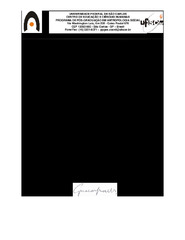| dc.contributor.author | Monticelli, Caio | |
| dc.date.accessioned | 2020-04-27T13:22:18Z | |
| dc.date.available | 2020-04-27T13:22:18Z | |
| dc.date.issued | 2020-02-21 | |
| dc.identifier.citation | MONTICELLI, Caio. Patá matá. O que dizem os Taurepáng sobre o fim do mundo. 2020. Dissertação (Mestrado em Antropologia Social) – Universidade Federal de São Carlos, São Carlos, 2020. Disponível em: https://repositorio.ufscar.br/handle/ufscar/12476. | * |
| dc.identifier.uri | https://repositorio.ufscar.br/handle/ufscar/12476 | |
| dc.description.abstract | The aim of this paper is to present the way in which the Taurepáng, Carib people who lives in the north of the state of Roraima in Brazil, has been interpreting the consequences of the Venezuelan crisis. Their communities are located on both sides of the border with this country, exactly halfway to one of the largest migratory flows in Latin American history. Following fieldwork in 2018 in the Bananal community, only twelve kilometers from the Venezuelan border, the argument is that the Taurepáng understand these events by activating aspects of their own practice of the Seventh-day Adventist religion. This understanding, by the way, refers to background cosmological problems. In this context, we highlight the intensification of mineral exploitation in the Venezuelan savannah and the increase of attacks and accusations of Kanaimé in the vicinity of the taurepáng communities that are there, as well as the relationship that these people maintain with a series of supernatural agents, among them, the “mineral himself owns”. The combination of all these elements reinforces something that the Taurepáng have already elaborated in their worship, namely, the notion that they live a world essentially "spoiled by the work of Satan". Overcoming this condition would be found in the post-mortem, in the place to be prepared in heaven by Jesus Christ. Given this perspective, Taurepáng’s pastors are the experts responsible for interpreting the “words of God” contained in the bible, and elaborating them in the form of sermons to members of the congregation, emphasizing the “good messages” about the heavenly paradise to be attained after death. | eng |
| dc.description.sponsorship | Fundação de Amparo à Pesquisa do Estado de São Paulo (FAPESP) | por |
| dc.language.iso | por | por |
| dc.publisher | Universidade Federal de São Carlos | por |
| dc.rights | Attribution-NonCommercial-NoDerivs 3.0 Brazil | * |
| dc.rights.uri | http://creativecommons.org/licenses/by-nc-nd/3.0/br/ | * |
| dc.subject | Etnologia indígena | por |
| dc.subject | Taurepáng | por |
| dc.subject | Crise venezuelana | por |
| dc.subject | Cristianismo indígena | por |
| dc.subject | Roraima | por |
| dc.subject | Indigenous ethnology | eng |
| dc.subject | Taurepáng | eng |
| dc.subject | Venezuelan crisis | eng |
| dc.subject | Indigenous christianity | eng |
| dc.title | Patá matá. O que dizem os Taurepáng sobre o fim do mundo | por |
| dc.title.alternative | Patá matá. What the Taurepáng people say about the end of the world | eng |
| dc.type | Dissertação | por |
| dc.contributor.advisor1 | Andrello, Geraldo Luciano | |
| dc.contributor.advisor1Lattes | http://lattes.cnpq.br/5447074379881029 | por |
| dc.description.resumo | O objetivo desse trabalho é apresentar a maneira pela qual os Taurepáng, povo Carib que no Brasil vive no norte do estado de Roraima, vem interpretando os desdobramentos da crise venezuelana. Suas comunidades se encontram dispostas dos dois lados da fronteira Brasil-Venezuela, exatamente no meio do caminho de um dos maiores fluxos migratórios da história da América Latina. Após um trabalho de campo em 2018 na comunidade do Bananal, distante apenas doze quilômetros da fronteira, a argumentação que se propõe é que os Taurepáng compreendem esses acontecimentos ativando aspectos de sua própria prática da religião Adventista do Sétimo Dia. Compreensão essa que, por sua vez, remete a problemas cosmológicos de fundo. Nesse contexto, destaca-se a intensificação da exploração mineral na savana venezuelana e o aumento de ataques e acusações de Kanaimé nas comunidades taurepáng que lá se encontram, bem como a relação cuidadosa que esse povo mantém com uma série de agentes sobrenaturais, dentre os quais o próprio “dono dos minérios”. A combinação de todos esses elementos reforça algo que os Taurepáng elaboram constantemente em seus cultos, a saber, a noção de que vivem em um mundo essencialmente “estragado pela obra de Satanás”. A superação dessa condição se encontraria no post-mortem, no lugar a ser preparado no céu por Jesus Cristo. Diante dessa perspectiva, os pastores taurepáng são os especialistas responsáveis por interpretar as “palavras de Deus” contidas na bíblia, e por transmiti-las na forma de sermões aos membros da congregação, dando especial ênfase às qualidades do paraíso celeste a ser alcançado após a morte. | por |
| dc.publisher.initials | UFSCar | por |
| dc.publisher.program | Programa de Pós-Graduação em Antropologia Social - PPGAS | por |
| dc.subject.cnpq | CIENCIAS HUMANAS::ANTROPOLOGIA::ETNOLOGIA INDIGENA | por |
| dc.subject.cnpq | CIENCIAS HUMANAS::ANTROPOLOGIA::TEORIA ANTROPOLOGICA | por |
| dc.description.sponsorshipId | FAPESP: 2017/19647-5 | por |
| dc.publisher.address | Câmpus São Carlos | por |
| dc.contributor.authorlattes | http://lattes.cnpq.br/3195580330549304 | por |


